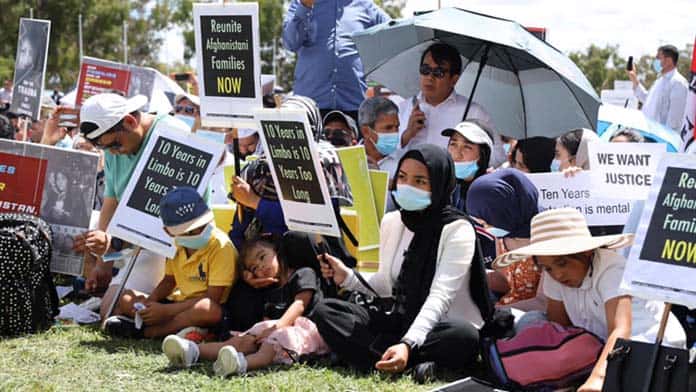More than 3000 Afghan refugees from across the country converged on Parliament House in Canberra on 8 February to press their demands for permanent visas and demand an immediate humanitarian intake of at least 20,000 from Afghanistan.
Temporary visas for boat arrivals were re-introduced by the Abbott Liberal government in December 2014. Under the deliberately discriminatory policy, any boat arrivals found to be refugees can only be granted a Temporary Protection Visa (TPV) for three years or a Safe Haven Enterprise Visa (SHEV), for five years. Around 33,000 asylum seekers, including around 5000 Afghans, were caught by the Liberals’ change of policy.
Temporary visa holders have a precarious existence. Rather than being able to settle permanently or become citizens, TPV and SHEV holders must re-apply for the visas as they expire every three or five years. They have no right to family reunion; they are permanently separated from their partners, mothers and children. They cannot travel outside Australia and return without special permission from the Minister for Home Affairs.
They are not eligible for any Commonwealth subsidy for study after 18 years of age, which, except for university scholarships, denies them access to tertiary education.
With the takeover of Afghanistan by the Taliban last year, the circumstances of the families of the thousands of Afghan refugees already in Australia became more precarious and dangerous overnight. With no hope of family reunion, they have been left in an impossible situation. Even the 3500 Afghans evacuated last year will not be able to sponsor their families until they are granted refugee status, which is likely to take a year or longer.
And thousands of others who had assisted Australia, including many who had been granted visas, were left behind.
Let them in
Morrison insisted that the number of evacuated refugees was a “floor, not a ceiling”, but in January the government announced that Australia would only take 15,000 Afghans over the next four years, not as a special intake, but from within the already limited quota of 13,750 a year.
This pathetic offer has outraged the Afghan community and the refugee movement. The Canberra rally was also demanding that Australia immediately offers a special intake of at least 20,000 Afghan refugees.
Highlighting Morrison’s hypocrisy even more, the government is refusing to lift its ban on accepting UNHCR refugees from Indonesia, where 7000 Afghan refugees have been waging their own campaign against Australia’s ban.
To make matters worse, the government has successfully appealed a Federal Court ruling that means it can lawfully send Afghan asylum seekers back to Afghanistan, even with the Taliban in power. It has long been a problem that tribunals or courts were unable to consider “changed country circumstances” even though it could be years between when an initial refugee assessment was made and moves to actually deport someone.
Many Hazaras have been denied protection visas because assessors or tribunals ruled that they could safely live in Kabul, even though their home province was unsafe. Even before the Taliban takeover, these rulings were unsound. Now it is obvious that Kabul is a very different and dangerous place.
Even though, last year, Immigration Minister Alex Hawke said, “No Afghan visa holder currently in Australia will be asked to return to Afghanistan while the security situation there remains dire,” the government wants to guarantee its power to deport Afghans.
Morrison ignored calls last year to grant an amnesty and permanent visas to all Afghans in Australia. Defence Minister Peter Dutton even alleged there could be Taliban sympathisers lurking among the evacuated Afghan interpreters.
Meanwhile the willful and arbitrary powers of the Home Affairs Minister were on display again this month. Minister Karen Andrews finally used her extraordinary powers in favour of a Filipino family that was denied employer-sponsored permanent residency in 2016 because their daughter, Patricia, has autism and is blind.
Andrews could use the same powers to allow the Murugappan Tamil family to go home to Biloela with permanent visas instead of being held in Perth, still at risk of deportation. The Minister could free the Medevac refugees in the Park hotel-prison and in detention centres with the flick of a pen.
Refugee rallies in Sydney on 20 March, and in Brisbane, Melbourne, Canberra and other cities on Palm Sunday (10 April) will be calling for an end offshore detention and for freedom for all the refugees.
By Ian Rintoul






